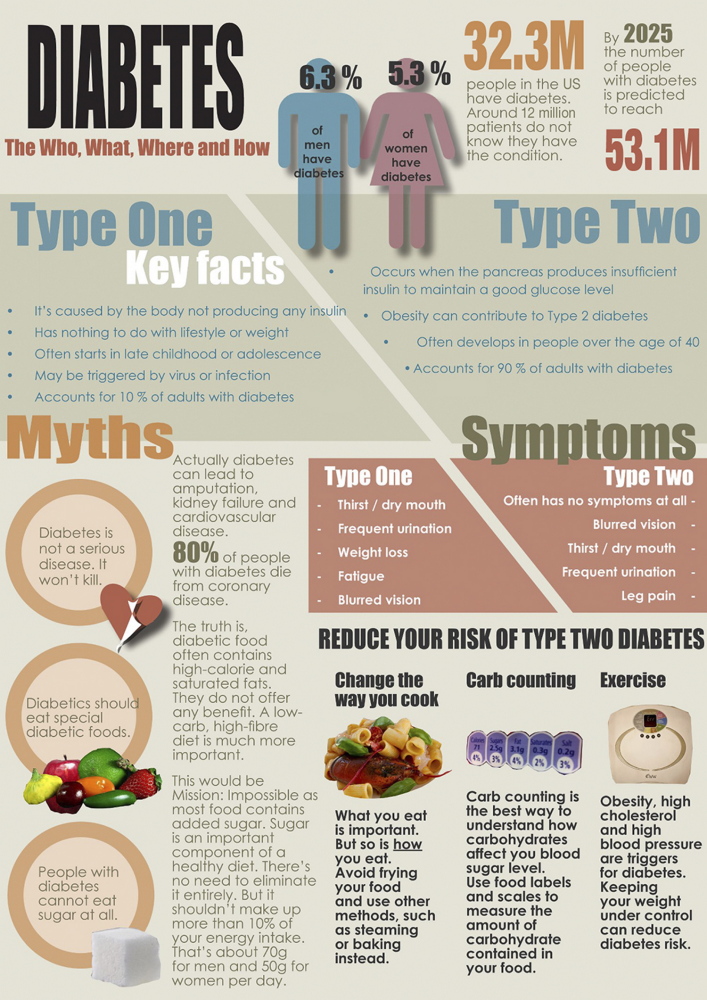Friday is World Diabetes Day, a time to get a grip on this epidemic. By next year in the United States, there will be almost 40 million people with diabetes, 83 million cases of pre-diabetes, and many new cases of blindness, leg amputations and kidney failure. Next year, some 342,000 Americans are likely to die from diabetes.
This is a terrible toll. And a costly one: Caring for everyone with diabetes in this country is likely to carry a price tag of around $380 billion next year.
We can’t sit idly by and watch this epidemic continue to explode. On this World Diabetes Day, we must do something about it, and it’s clear what needs to be done.
A report in the September issue of Diabetes Care by four leading diabetes authorities points out that we could make a serious dent in diabetes by finding pre-diabetes and early diabetes cases when they are first evident and treating them more effectively.
The authors say we often diagnose the disease 10 years too late, so they recommend routine screening, combined with appropriate disease management. We need universal screening of people older than age 20. This should take place not just in medical offices but also in churches, community centers and other social gathering places.
Diabetes in this country today has to be recognized as an epidemic and dealt with as such through a public health approach.
It is no longer just an individual health concern, a matter between doctors and patients. It affects the entire community.
And it affects the workplace. It drains productivity through absenteeism and less effectiveness on the job, and many diabetics leave the work force early because of disability or early death.
State and local health departments need to take the lead. In addition, however, we need to form broad-based community councils for diabetes control and prevention. Public awareness of the problem — and of possible solutions — is paramount, and everybody must be involved in dealing with it.
Prevention is key. We’ve got to change the dietary and exercise behavior of our population, beginning with our children in preschool and elementary school.
Then if we block the conversion of pre-diabetes to diabetes we could see the positive health and budget results in a short time.
And with an organized approach to improve the care of diabetes patients, we could begin to diminish the complications of diabetes: the blindness, leg amputations and years of dialysis because of kidney failure.
Now that we know what we have to do, let’s mobilize the public and political will to get at the task. The health and financial well-being of the country is at stake.
Failure is not an option.
Let’s mark this World Diabetes Day as the day we started to salvage the health and wealth of the country from the grip of the diabetes epidemic.
Dr. Gilbert H. Friedell is professor emeritus of behavioral science at the University of Kentucky. He’s the author, with J. Isaac Joyner, of “The Great Diabetes Epidemic: A Manifesto for Control and Prevention.” He wrote this for Progressive Media Project. It was distributed by MCT Information Services.

Send questions/comments to the editors.



Success. Please wait for the page to reload. If the page does not reload within 5 seconds, please refresh the page.
Enter your email and password to access comments.
Hi, to comment on stories you must . This profile is in addition to your subscription and website login.
Already have a commenting profile? .
Invalid username/password.
Please check your email to confirm and complete your registration.
Only subscribers are eligible to post comments. Please subscribe or login first for digital access. Here’s why.
Use the form below to reset your password. When you've submitted your account email, we will send an email with a reset code.